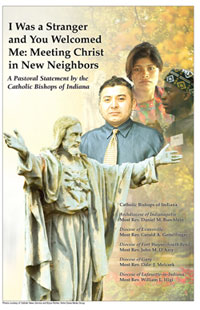In pastoral, Indiana bishops urge welcoming immigrants
 Criterion staff report
Criterion staff report
The Indiana Catholic bishops call the faithful “to welcome others as Christ himself” in a pastoral letter on the treatment of immigrants issued on Jan. 12.
Titled “I Was a Stranger and You Welcomed Me: Meeting Christ in New Neighbors,” the pastoral is the first of its kind issued collectively by the Indiana bishops in recent times.
(Read the pastoral letter: English | Spanish)
The joint letter is signed by Indianapolis Archbishop Daniel M. Buechlein, Lafayette Bishop William L. Higi, Fort Wayne-South Bend Bishop John M. D’Arcy, Gary Bishop Dale J. Melczek and Evansville Bishop Gerald A. Gettelfinger.
Typically, statements from the bishops are done though the Indiana Catholic Conference, the Church’s official public policy voice. However, the pastoral letter is a unique move by the bishops giving the statement a distinctive teaching authority which carries more significance and weight—that of shepherds addressing the faithful.
“We Catholic bishops of Indiana recommit ourselves and our dioceses to welcoming others as Christ himself,” the pastoral says. “Together with all our sisters and brothers throughout the state of Indiana, we embrace an authentic and enduring form of Hoosier hospitality that goes beyond superficial slogans to the heart of what it means to be a community of faith that welcomes all who wish to share our way of life.”
In the letter, the Indiana bishops remind the faithful of Pope Benedict XVI’s first encyclical, Deus Caritas (“God is Love”), saying “there is an intimate and unbreakable connection between love of God and love of neighbor. In loving our neighbor, we meet the person of Christ.”
The pastoral defines a neighbor “not simply as someone who is familiar and close at hand, [nor] someone who shares my ethnic, social or racial characteristics.”
Rather, as the Gospels define neighbor, “Our neighbor is anyone who is in need—including those who are homeless, hungry, sick or in prison. A neighbor may well be a complete stranger whose background, experience or social standing is very different from ours,” the bishops say.
In the letter, the bishops recognize and “vigorously support” the “nation’s right and responsibility to provide secure borders for the protection of our people and to guard against those who would do harm,” but the bishops “reject positions or policies that are anti-immigrant, nativist, ethnocentric or racist. Such narrow and destructive views are profoundly anti-Catholic and anti-American.”
They call for balance between “the right of a sovereign state to control its borders, and “the right of human persons to migrate so that they can realize their God-given rights.” The pastoral says, “the state may impose reasonable limits on immigration, but the common good is not served when the basic human rights of the individual are violated.”
The pastoral calls Catholics to recognize the fundamental moral principle of the dignity of all persons from conception to natural death. The letter stresses the inherent rights of immigrants and says “the human dignity and human rights of undocumented immigrants should be respected,” and be the guiding force for immigration reform.
The letter says, “Immigration reform is evident and should include a broad-based program of earned legalization for undocumented persons; a temporary worker program with appropriate protections for both U.S. and foreign workers; changes to the family-based immigration system to reduce waiting times for family reunification; and restoration of due process for immigrants.”
The letter also says, “Immigrants in this country without proper documentation should be provided opportunities to obtain legalization if they demonstrate good moral character and earned legalization should be achievable and independently verifiable.”
“In their pastoral care for the Church, the bishops are addressing this statement to the Church faithful primarily, but it is not exclusively an internal document,” said Glenn Tebbe, executive director of the Indiana Catholic Conference. “It is also for the benefit of anyone who is interested. The pastoral statement is a public letter to the Church addressing an issue of importance to the Church for the good of the Church and the civic community.”
In the letter, the bishops address the direction and debate in which public policy in Indiana should take during the coming and future sessions of the Indiana General Assembly, including: “driver’s permits for undocumented immigrants who must drive to work in order to feed and clothe their families; driver’s permits needed for securing automobile license and insurance; a broader process for immigrants to obtain legal documents for ownership of property beyond the Bureau of Motor Vehicles (BMV); access to health care and education for immigrant children; and equal access to protective and emergency services for immigrants.”
According to the 2000 census, 3.1 percent of Indiana residents, or more than 186,500, are foreign born. This includes those who are now citizens and those here as non-immigrants, such as refugees, students and workers with visas as well as the undocumented residents. Growth since 2000 is estimated to be approximately 68,000, raising the total to 4 percent of the total population.
The U.S. Department of Labor projects that by 2010, the U.S. will create 22 million new jobs—9 million more jobs than new workers entering the job market. This gap will increase after 2010 as the “baby boomers” reach retirement age and leave the labor force.
According to the 2006 general summary of the Official Catholic Directory P.J. Kenedy & Sons, the Archdiocese of Indianapolis has 232,273 Catholics; the Diocese of Lafayette-in-Indiana has 105,196; the Diocese of Evansville has 87,821 Catholics; the Diocese of Fort Wayne/South Bend has 156,509 Catholics; and the Diocese of Gary has 185,550 Catholics, for a total of 767,349 Roman Catholics in the state.
For information regarding state issues and further explanation of conference information, log on to the Indiana Catholic Conference Web page at www.indianacc.org. †
